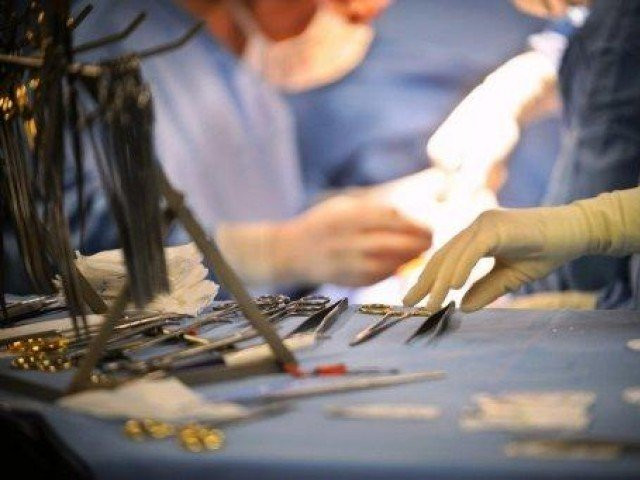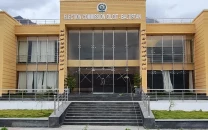K-P’s first gynaecological oncology surgery performed at ATH
Septuagenarian woman undergoes surgery to remove malignant ovarian cysts

PHOTO: AFP
But surgery — the first of its kind in Abbottabad — helped remove the cyst and arguably save her life.
Hailing from Swabi Mera, the 77-year-old woman was rushed to the Ayub Teaching Hospital (ATH) in Abbottabad.
After examining her swollen abdomen and conducting a host of tests, doctors determined that she had a massive mass (cyst) on her ovaries (ovarian cancer), apart from suffering from other ailments.
Reviewing her medical condition, doctors advised surgery to remove the cyst.
K-P sets Rs3b to improve periphery medical facilities
But with the surgery costing over half a million rupees at private medical facilities, public hospitals lacking the requisite expertise, the treatment was simply out of the reach of Jan’s family.
However, at the turn of the year, Jan’s family got a call from the ATH with some good news. A gynaecological oncologist had joined the Gynecology department of the hospital and was willing to perform the necessary surgery, and that the family will not have to pay anything for it.
Jan subsequently went under the knife, and for the first time in the history of Khyber-Pakhtunkhwa (K-P), doctors removed the cyst by dissecting the lymph nodes and omentectomy. Moreover, they conducted an appendectomy, removing her gallbladder.
The surgery was performed by Gynecological Oncologist Dr Bushra Khan. She is believed to be one of four gynaecological oncologists in the country but the only one who is working in the public sector.
K-P docs repair aortic aneurysm
Gynecologic oncology is a specialised field of medicine which focuses on cancers of the female reproductive system, including ovarian cancer, uterine cancer, vaginal cancer, cervical cancer, and vulvar cancer. As specialists, they have extensive training in the diagnosis and treatment of these cancers.
ATH Media Manager Amber Javed said that Dr Bushra trained for two years at the Agha Khan University and had joined ATH on January 1.
Within a week after joining, she performed the unusual and complicated surgery. The surgery was a success and was performed under the supervision of LRH Head of the Gynecology Department Dr Rubina Bashir, Javed said.
Among Asian countries, Pakistan has the highest rate of breast and ovarian cancer. Ovarian cancer is the second most common cancer amongst women in Pakistan.
Ovarian cancer develops when a fluid-filled cyst in the ovaries does not go away or increases in size. This type of cancer can spread to other nearby organs such as the uterus or the fallopian tubes, and through the lymphatic system throughout the abdomen, chest or pelvis or through the bloodstream to the liver or lungs. Though symptoms are vague, they may include abdominal or pelvic discomfort or pressure, abdominal swelling, back or leg pain, bloating, changes in bowel function or urinary frequency, gastrointestinal issues such as long-term stomach pain or indigestion, fatigue, nausea, loss of appetite, a malnourished or sickly appearance, and unusual vaginal bleeding.
Suspects in K-P face punishment beyond kidney theft
“Women in developing countries such as Pakistan, tend to die at a greater rate than in more developed countries because the disease is generally detected when it is in its advanced stages,” Dr Bushra said.
She added that early detection of ovarian cancer was crucial for its treatment and advised that patients must make sure they visit their physician for an examination once a year. Moreover, she urged them to register at the Gynecology Department’s Outpatient Department at ATH, to register themselves so that they can avail free treatment, especially those with a history of abdominal problems or of ovarian cancer.
Published in The Express Tribune, January 16th, 2018.



















COMMENTS
Comments are moderated and generally will be posted if they are on-topic and not abusive.
For more information, please see our Comments FAQ